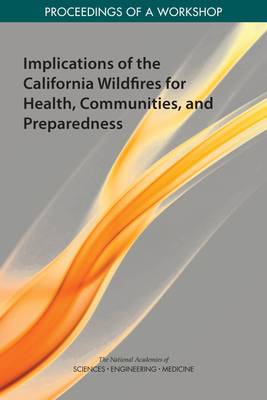
- Afhalen na 1 uur in een winkel met voorraad
- Gratis thuislevering in België vanaf € 30
- Ruim aanbod met 7 miljoen producten
- Afhalen na 1 uur in een winkel met voorraad
- Gratis thuislevering in België vanaf € 30
- Ruim aanbod met 7 miljoen producten
Implications of the California Wildfires for Health, Communities, and Preparedness
Proceedings of a Workshop
National Academies of Sciences Engineering and Medicine, Health and Medicine Division, Board on Population Health and Public Health Practice, Board on Health Sciences Policy, Roundtable on Environmental Health Services Research and Medicin, Roundtable on the Promotion of Health Equity, Roundtable on Population Health Improvement, Forum on Medical and Public Health Preparedness for Disasters anOmschrijving
California and other wildfire-prone western states have experienced a substantial increase in the number and intensity of wildfires in recent years. Wildlands and climate experts expect these trends to continue and quite likely to worsen in coming years. Wildfires and other disasters can be particularly devastating for vulnerable communities. Members of these communities tend to experience worse health outcomes from disasters, have fewer resources for responding and rebuilding, and receive less assistance from state, local, and federal agencies. Because burning wood releases particulate matter and other toxicants, the health effects of wildfires extend well beyond burns. In addition, deposition of toxicants in soil and water can result in chronic as well as acute exposures.
On June 4-5, 2019, four different entities within the National Academies of Sciences, Engineering, and Medicine held a workshop titled Implications of the California Wildfires for Health, Communities, and Preparedness at the Betty Irene Moore School of Nursing at the University of California, Davis. The workshop explored the population health, environmental health, emergency preparedness, and health equity consequences of increasingly strong and numerous wildfires, particularly in California. This publication is a summary of the presentations and discussion of the workshop.
Specificaties
Betrokkenen
- Auteur(s):
- Uitgeverij:
Inhoud
- Aantal bladzijden:
- 160
- Taal:
- Engels
Eigenschappen
- Productcode (EAN):
- 9780309499873
- Verschijningsdatum:
- 1/10/2020
- Uitvoering:
- Paperback
- Formaat:
- Trade paperback (VS)
- Afmetingen:
- 152 mm x 229 mm
- Gewicht:
- 301 g

Alleen bij Standaard Boekhandel
Beoordelingen
We publiceren alleen reviews die voldoen aan de voorwaarden voor reviews. Bekijk onze voorwaarden voor reviews.







